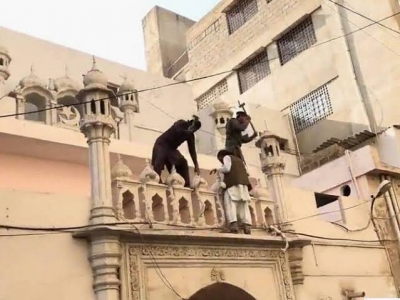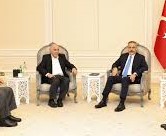According to data compiled by the Ahmadiyya community, at least 264 Ahmadi Muslims were killed in targeted attacks, mob violence, and bombings between 1984 and 2018….reports Asian Lite News
On April 18 this year, a 47-year-old car workshop owner was brutally killed with sticks and bricks as a mob of hundreds stormed his place of worship, while numerous others had to be rescued by police in the city of Karachi, Pakistan.
This horrific incident, which should provoke national outrage and deep sorrow, failed to elicit a strong response from civil society or a decisive intervention from the state.
The reason lies in the fact that both the victim and the worship site belonged to the Ahmadi Muslim minority— a community that routinely faces violent persecution, systemic political and bureaucratic discrimination, and institutionalised oppression within Pakistan.
Each year, reports by governmental bodies, international human rights organisations, and community advocates document the persistent assaults on Ahmadi Muslims in Pakistan by Islamist factions or radicalised mobs, with no meaningful intervention by the state. In some instances, the state appears overtly complicit in such actions— for example, in March of this year, a 120-year-old Ahmadi place of worship was demolished by police following pressure and complaints from Islamist groups claiming the structure resembled a mosque.

To offer a glimpse into the societal persecution faced by this community: Ahmadi Muslim graves are frequently defiled and vandalised, while individuals endure constant harassment, targeted assassinations, mob violence, unofficial commercial boycotts, employment discrimination, and abuse on digital platforms. This is compounded by the alarming frequency of blasphemy accusations levelled against Ahmadi Muslims, for reasons such as possessing the Quran, inscribing Prophet Muhammad’s name on a wedding invitation, or engaging in prayer using language or gestures considered distinctly Islamic.
While opposition to the Ahmadiyya community has existed since its inception in the late 19th century by Mirza Ghulam Ahmad of Qadian in Punjab, the most critical blow to Ahmadi Muslims in Pakistan was delivered through the 1974 constitutional amendment, which officially declared them non-Muslims. Despite sharing the majority of beliefs and practices with mainstream Muslims, Ahmadis diverge in their recognition of Mirza Ahmad as the Mahdi or Messiah, a belief that conflicts with the Islamic doctrine of Khatam-e-Nubuwwat (the finality of the Prophet Muhammad).
Subsequently, in 1984, General Zia-ul-Haq issued an ordinance prohibiting Ahmadi Muslims from performing Islamic rites or displaying religious symbols associated with Islam, such as erecting domes or minarets on their places of worship. In 1985, he also introduced segregated voter lists based on religious identity, effectively requiring Ahmadi Muslims to renounce their beliefs in order to vote. This marked the onset of a formalised system of legal disenfranchisement and persecution, which continues today. Although the practice of separate electoral rolls was ended in 2002, Ahmadi Muslims were excluded from this reform.
The requirement to repudiate their faith has since permeated various aspects of governance, barring them from essential state services such as obtaining a passport. Notably, in October 2022, Punjab’s provincial government mandated the inclusion of a declaration affirming the finality of the Prophet Muhammad within the marriage registration form.
The emergence of the far-right Tehreek-e-Labbaik Pakistan (TLP), the group whose supporters were involved in the recent attack and killing of an Ahmadi Muslim man in Karachi, has significantly deepened the climate of fear and marginalisation experienced by the community. The TLP rose to national attention in 2017 when it staged a three-week blockade of a major highway in Islamabad to protest a minor amendment to the electoral oath, which the group perceived as a dilution of the state’s stance against Ahmadi Muslims.
The government ultimately conceded to their demand by reinstating the original wording, resulting in the resignation of Law Minister Zahid Hamid. Such is the influence of far-right sentiment that, in 2018, the Imran Khan-led PTI government succumbed to pressure from extremist groups and requested that Princeton professor Atif Mian resign from his role as Economic Adviser solely on account of his Ahmadi Muslim identity.
While the systemic exclusion of Ahmadi Muslims in Pakistan was initiated and continues to be upheld by the state, the deep-seated societal animosity it has fostered has now grown beyond the state’s control. Decades of intentional state policy targeting the community for political gain have inflicted lasting damage on the nation, fostering a society deeply afflicted by radicalism, self-destructive impulses, and toxic intolerance.
According to data compiled by the Ahmadiyya community, at least 264 Ahmadi Muslims were killed in targeted attacks, mob violence, and bombings between 1984 and 2018. It is important to note that even Pakistan’s first and only Nobel Laureate, Abdus Salam, was not spared from the effects of this pervasive hostility— his gravestone was defaced to erase the word ‘Muslim’ due to his Ahmadi Muslim identity.














